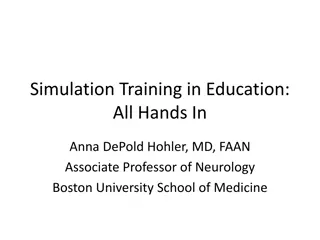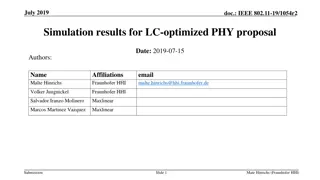Enhancing Simulation Learning Through Effective Debriefing Practices
Debriefing in simulation-based education plays a crucial role in improving learning outcomes and psychological safety. This approach focuses on perceptions, experiences, and expectations, utilizing a combination of deductive and inductive methods. Key findings suggest that faculty support and a supportive peer group are vital for enhancing psychological comfort. Leaders' non-clinical skills and personality traits are emphasized for successful debriefing sessions, with a focus on encouraging learner participation and understanding actions. Faculty involvement is deemed essential for quality debriefing to facilitate effective learning despite potential discomfort.
Download Presentation

Please find below an Image/Link to download the presentation.
The content on the website is provided AS IS for your information and personal use only. It may not be sold, licensed, or shared on other websites without obtaining consent from the author.If you encounter any issues during the download, it is possible that the publisher has removed the file from their server.
You are allowed to download the files provided on this website for personal or commercial use, subject to the condition that they are used lawfully. All files are the property of their respective owners.
The content on the website is provided AS IS for your information and personal use only. It may not be sold, licensed, or shared on other websites without obtaining consent from the author.
E N D
Presentation Transcript
What is the educational value of debriefing in relation to: Content and conduct Faculty Psychological safety 4
Phenomenologial approach concerned with perceptions, experiences and expectations Combined deductive and inductive approaches Framework analysis Questionnaires for 26 FDs as the main source of data Complemented by focus groups for specific topics Contrasted with data from 2 interviews with the faculty to triangulate data sources Timing of data collection directly after debriefing sessions Formal UCL Ethics Committee Approval 5
Content Content Conduct Conduct Outcomes Outcomes Faculty Faculty Psychological comfort Supportive familiar peer group is a single most important factor improving comfort followed by introduction and small size groups Psychological comfort Communications skills, teamwork, leadership and application of protocols are the most important topics Everyone should be involved in debriefing The aim of debriefing is to gain understanding and develop strategies A dedicated lead for debriefing is essential Leaders personality and non-clinical skills are more important than clinical expertise It should not be overly negative or target individuals The learning points should be general and for everyone Foundation doctors Foundation doctors Recall in debriefing helps make sense of chaos Leader should be amiable and enthusiastic about simulation A degree of discomfort is common among FDs Stress is inevitable like in clinical work The emotional impact on the learner is the most important topic but technical skills may have to be covered beforehand Leader and group should be honest with the learner and not provide false reassurance The aim of debriefing is to encourage participation in simulation and to help learner understand their actions Faculty is essential for quality debriefing Learning cannot occur without discomfort Faculty should allow learner to express discomfort Faculty Faculty 6
Clinical expertese Non-clinicall skills and attitudes: encouraging participation, enthusiastic about simulation, skills in critical feedback, honest and impartial Personality: nonjudgmental, approachable, friendly Personality - stern Debriefing style - negative, domineering 11
Entirely comfortable Comfortable enough Borderline Somewhat uncomfortable Entirely uncomfortable 0 2 4 6 8 10 Large group Small group Introd uction Supportive peer group Unfamiliar group Simulation itself 12
Content and conduct of debriefing Shared understanding as the key outcome of debriefing (Wallace 2007) Debriefing as a tool to make sense of chaos (Gallagher 2005) Communication, teamwork, application of protocols and leadership are the most valued topics. (the issues with comparison between studies) Emotional impact a stark divergence between the learners and faculty 13
Faculty Presence of faculty to lead debriefing is essential Task-versus-relationship dilemma (Rudolph 2006) Advocacy-inquisitive style Personality and attitudes are superior to clinical expertise (Tan 2005) 14
Psychological comfort Peer group attitude is the single largest determinant The importance of confidentiality and introduction Moving the heat from the individual to the group (Rudolph 2013) Psychological discomfort is an element of the learning environment (Ledderman 1992) 15
The use of pre-determined themes and the emergence of the 4th theme Why boundaries between themes are artificial Why knowing what the learner wants is important and did I answer the research question? The challenges of nomenclature and comparison between studies Questionnaire design and the order effect 16
Debriefing should focus on communications skills, application of medical protocols, leadership and teamwork. 1. Recollection of the events from the scenario should form an integral part of debriefing 2. Critical feedback should be conveyed in a way that is clear and honest without the use of conciliatory techniques such as sugar-coating or sandwich feedback . 3. The primary aim of the faculty should be to understand the learner as the first step to help the learner modify their behaviours 4. Faculty should open the discussion to the group early and avoid dwelling on critiquing the individual in the hot seat 5. Faculty leading debriefing should be selected based on personality and excellent non-clinical skills. Faculty less senior then consultant can lead debriefing as clinical expertise is a secondary requirement. 6. Learners should be challenged in order to achieve a degree of psychological discomfort 7. Groups should be small and consist of colleagues who know one another 8. Debriefing must always be proceeded by introduction and assurance of confidentiality 9. 17
Thank you 18























